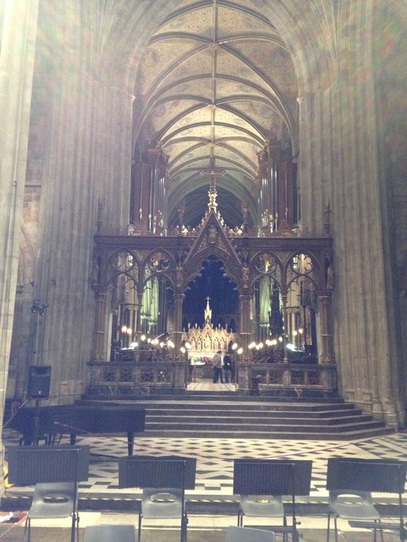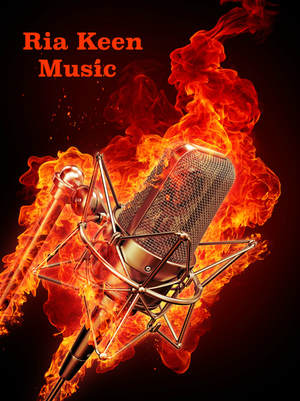 I spend my whole life teaching singers technique, researching technique, practising technique, discussing technique. This probably makes me boring in the extreme, but sometimes, all that know-how comes in handy. I believe in building a good instrument before you learn to play it, and as I am now older than some buildings (as my good friend Givvi Flynn is inclined to tell me) my instrument was built many years ago. It's pretty solid, and I can more or less do anything I want with it, under fair-to-middling conditions. I usually think of technique as being two-part: firstly, it is what we use to develop a great vocal instrument, and secondly it is what helps us to achieve athletic vocal performances and the kind of fireworks that Joe Public seems to like. Sometimes, though, there's a third purpose, and that's to get us out of trouble when things go wrong, which they did last in spectacular fashion at Worcester Cathedral during a concert. This particular concert was always going to be tricky: it was with VU, who usually work to track, but this time we were working with a single pianist, and the acoustics in the Cathedral - which is the size of a small country - are notoriously unhelpful unless you're standing right in the sweet spot, which we weren't (that had been reserved for the orchestra who had flown in from Germany - fair enough). I'd constructed a nice set, including a solo spot for me, backed by VU, just to offer the audience a different colour. After all, most people love chocolate, but that doesn't mean you're going to say no to a sherbet lemon ;-) The solo that I picked was one that I did in a concert this Summer and which went down particularly well. It's a song called "Immortal", and was composed by the late great Eric Wolfson of The Alan Parsons Project. The song was originally sung by Steve Balsamo, better than anyone else ever will, and is a big and technical sing, to say the least of it. The bridges in the song (in the key that I sing it in, anyway) are particularly tricky, and rely on a lot of subtlety and control which can only be achieved on the mic. In other words, if I'd intended to sing the song un-mic'd, the key would have been completely different. Imagine my joy, therefore, when the PA went down just as I picked up the mic to start singing... I had no choice, I had to sing it unamplified. No problem for the section of the song which was just me and the piano, but when a 90-strong chorus kicks in at full pelt, even my big mouth isn't enough to be heard over them. Bless 'em all they did their bit, pulled back from their usual tumultuous blast and gave me some room, but even so it was a big, big ask. I did my job and got from one end of the song to the other - although not in the form that I would have liked - and spent 4 minutes 30 (yes, it had to be a long song, of course) summoning The Force, calling upon the help of all the gods who were going to get me struck by lighting in that venerable building and using every single ounce of technique that I have. It was only afterwards that I remembered to be grateful that I could switch from amplified technique to un-amplified, because if I didn't know what I was doing and relied instead on opening my mouth and hoping for the best, as so many singers do, I would've been sunk. Now, I don't want you to think that I'm saying that technique is everything. It isn't. Artistry is equally important, and most of the time, technique can be something we consign to the practise room, but when the chips are down onstage, it becomes the centre of the universe. All of which is to lead to the question: how secure is your technique?
0 Comments
|
my castle, my game, my rulesMy occasional thoughts, rants, updates and perspectives various. Definitely not the opinions of the BBC. Archives
April 2014
Categories
All
|
|
Proud to be... PRINCIPAL OF THE VOICE COLLEGE Courses, workshops & training for singing teachers and singers worldwide. You're looking for great training? You've found it. Proud to be...
MUSICAL DIRECTOR OF Voices Unlimited - Worcestershire's biggest and most dynamic independent adult contemporary choir. Proud to be... PATRON OF Birmingham Institute of Theatre Arts Industry-standard training for young triple-threat performers in Birmingham. |
 RSS Feed
RSS Feed
